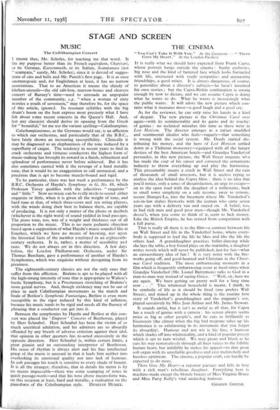THE CINEMA
"You Can't Take It With You." At the Gaumont—" There Goes My Heart." At the London Pavilion IT is really what we should have expected from Frank Capra, whose portrait hangs outside the cinema : bushy eyebrows,
big nose and the kind of battered face which looks barnacled with life, encrusted with ready sympathies and unexacting friendships, a good mixer. It is always dangerous, of course, to generalise about a director's subjects—he hasn't invented his own stories ; but the Capra-Riskin combination is strong enough by now to dictate, and we can assume Capra is doing what he wants to do. What he wants is increasingly what the public wants. It will adore the new picture which con- tains what it treasures most—a good laugh and a good cry.
As for the reviewer, he can only raise his hands in a kind of despair. The new picture is the Christmas Carol over again—with its sentimentality and its gusto and its touches of genius : no technical mistakes this time as there were in Lost Horizon. The director emerges as a rather muddled
and sentimental idealist who feels—vaguely—that something
is wrong with the social system. Mr. Deeds started dis- tributing his money, and the hero of Lost Horizon settled
down in a Thibetan monastery—equipped with all the luxury
devices of the best American hotels—and Grandpa Vanderhof persuades, in this new picture, the Wall Street magnate wl- o has made the coup of his career and cornered the armaments
industry to throw everything up and play the harmonica. This presumably means a crash in Wall Street and the ruin of thousands of small investors, but it is useless trying to
analyse the idea behind the Capra films : there is no idea that you'd notice, only a sense of dissatisfaction, an urge to escape—
on to the open road with the daughter of a millionaire, back to small town simplicity on a safe income, away to remote, secure Shangri-La, into the basement where Mr. Vanderhof's son-in-law makes fireworks with the iceman who came seven years ago with a delivery van and stayed on. A belief, too, in bad rich men and good poor men—though Mr. Vanderhof doesn't, when you come to think of it, seem to lack money. Like the British Empire, he has retired from competition with a full purse.
That is really all there is to the film—a contrast between life on Wall Street and life in the Vanderhof home, where every- body is supposed to lead the life he likes and like the life the others lead. A granddaughter practises ballet-dancing while she lays the table, a boy friend plays on the marimba, a daughter writes novels which will never be published, just for fun—what
an extraordinary idea of fun ! It is very noisy with the fire- works going off, and good-hearted and Christian in the Christ- mas Carol tradition. The most embarrassing moments in a film which is frequently embarrassing occur at meal-times when Grandpa Vanderhof (Mr. Lionel Barrymore) talks to God in a
man-to-man way instead of saying Grace. "Well, sir, here we are again. We been getting on pretty well for a long time
now . . ." This whimsical household is meant, I think, to be symbolic of life as it should be lived (one prefers Wall Street), and mixed up in the whole thing is the .routine love story of Vanderhof's granddaughter and the magnate's son, played sensitively by Miss Jean Arthur and Mr. James Stewart.
It sounds awful, but it isn't as awful as all that, for Capra has a touch of genius with a camera : his screen always seems twice as big as other people's, and he cuts as brilliantly as Eisenstein (the climax when the big bad magnate takes up his harmonica is so exhilarating in its movement that you forget its absurdity). Humour and not wit is his line, a humour which shades off into whimsicality, and a kind of popular poetry which is apt to turn wistful. We may groan and blush as he cuts his way remorselessly through all finer values to the fallible human heart, but infallibly he makes his appeal—to that great soft organ with its unreliable goodness and easy melancholy and baseless optimism. The cinema, a popular craft, can hardly be expected to do more.
There Goes My Heart--a reporter pursues and falls in love with a rich man's rebellious daughter. Everything here is machine-made except the blonde beauty of Miss Virginia Bruce and Miss Patsy Kelly's vital underdog humour.
GRAHAM GREENE.










































 Previous page
Previous page